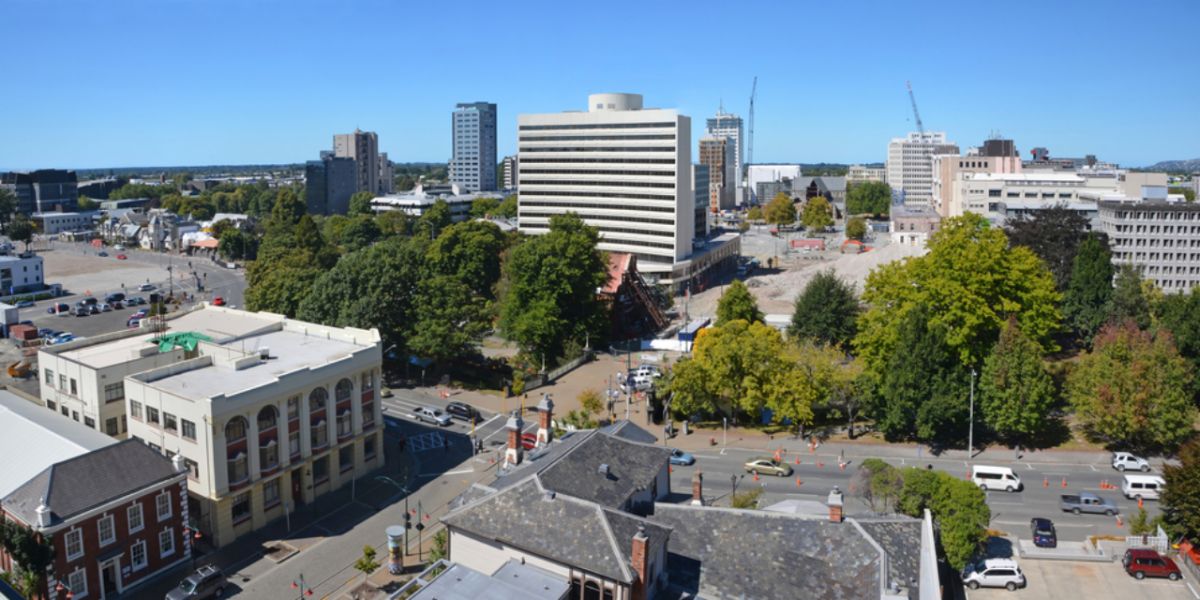
Christchurch, or Chch, as the locals like to say, is one of the major South Island cities in New Zealand. It is the capital of the Canterbury province and is slowly rebuilding itself after the 2010 and 2011 earthquakes. Although more than ten years have passed since the devastating earthquakes, the city is still in a transitional period, which means there are many opportunities for growth as the city re-establishes itself and seeks to attract new residents.
Due to a large number of people leaving after the earthquakes, Christchurch has relied on a large number of foreign workers to rebuild the city. Because of this, it can be fairly easy to find work in Christchurch, especially if you work in the engineering, building and construction sectors.
Christchurch's economy
Christchurch is the largest city in the South Island of New Zealand and is an important economic hub for the region. The city has a diversified economy, with a mix of manufacturing, agriculture, tourism, and service industries. According to data from the New Zealand Government, the median salary in Christchurch in 2021 was NZ$52,000 per year. This figure is likely to have changed somewhat over time as the cost of living and overall economic conditions in the city have evolved.
The gross domestic product (GDP) of the Canterbury region was estimated to be around NZ$41 billion in the 2021 financial year. This represents a significant contribution to the overall economy of the country.
The region is known for its strong agricultural sector and exports a range of primary products, including dairy products, meat, grain and wool. Dairy is a particularly important export industry for Canterbury, with the region being home to a number of large dairy processing facilities. These facilities produce a range of dairy products, including milk, cheese, and butter, which are exported to countries around the world. The region is also home to a number of forestry and timber operations, which export wood products such as logs and lumber.
Christchurch is home to a number of manufacturing businesses, including food processing and engineering firms. Due to its prominence in the agricultural and manufacturing industries, Canterbury's products play a significant role in New Zealand's export market, thanks to dairy, lamb and wool production. According to data from Statistics New Zealand, Canterbury accounted for around 20% of New Zealand's total exports in 2021. This figure includes both primary products, such as dairy and meat, and manufactured goods and services.
Tourism is another important industry in Christchurch, with the city's natural beauty and proximity to the Southern Alps attracting many visitors each year. The service sector, including retail, healthcare, and education, is also a major contributor to the local economy.
The labor market in Christchurch
Due in part to the major earthquakes the city has suffered, Christchurch sustains a large number of construction and engineering jobs. After the earthquakes, New Zealanders flooded to Christchurch for work and to assist in the rebuild, but this boom has largely flattened, opening up some of these positions for expatriates.
Beyond construction and engineering, the labor market in Christchurch is diverse and offers a range of employment opportunities across a range of industries. The city's strong agricultural sector is a major employer, with a variety of crops and livestock being produced in the region. Manufacturing is also an important industry in Christchurch, with many food processing and engineering firms based in the city.
Tourism is a major contributor to the local economy, with many hotels, restaurants, and other tourism-related businesses operating in the city. The service sector, including retail, healthcare, and education, is also a significant employer in Christchurch.
Major employers in Christchurch include the University of Canterbury, the Canterbury District Health Board, and Fonterra (a global dairy company with a significant presence in the region). The city is also home to several smaller businesses and startups, which can provide employment opportunities in a range of fields.
Overall, the labor market in Christchurch is likely to be competitive, as the city has a diverse economy and a relatively high cost of living. However, with a range of industries and employers operating in the city, there are likely opportunities available for workers with a range of skills and qualifications.
Labor shortages in Christchurch
New Zealand, like many other countries, has experienced labor shortages following the COVID-19 pandemic. The pandemic has led to a range of factors that have contributed to these shortages, including border closures, reduced immigration, and changes in the way people work and live.
Now that New Zealand's borders are open, efforts are being made to fill some of these shortages with overseas workers. Potential expats to New Zealand should be aware that Immigration New Zealand recently expanded the Green List, which is a list of in-demand occupations that qualify for a fast-track to residence or have access to a work-to-residence pathway. Consulting the list is an excellent way to determine which skill areas require labor from overseas. Though the list applies to New Zealand as a whole, the general trend is borne out in Christchurch.
However, due to Canterbury's proximity to prime agricultural and horticultural areas, as well as the ongoing recovery from the 2010-2011 earthquakes, there are some industries in Christchurch that are particularly in need of workers:
- Agriculture and horticulture: Canterbury is one of the country's major agricultural regions, with a strong focus on dairy, sheep and beef farming, and horticulture. There is a high demand for workers in this industry, particularly during the peak harvest season. Workers are needed for roles such as picking fruit and vegetables, milking cows, and general farm work.
- Construction: Canterbury is also experiencing a construction boom, with a high demand for workers in the building and construction industry. Workers are needed for roles such as carpenters, electricians, plumbers, and general laborers.
- Healthcare: The healthcare industry is another industry in high demand for workers in Canterbury, with a range of positions available in hospitals, clinics, and aged care facilities. Workers are needed for roles such as nurses, healthcare assistants, and support staff.
- Hospitality and Tourism: While the tourism industry has been impacted by the COVID-19 pandemic, there are still opportunities for workers in the hospitality sector in Canterbury, particularly during the summer season. Workers are needed for roles such as chefs, kitchen staff, waiting staff, and hotel housekeeping.
- Manufacturing: Canterbury has a significant manufacturing industry, particularly in the areas of engineering, food processing, and wood products. There is a high demand for workers with experience in these areas, particularly in roles such as machine operators, assemblers, and quality control.
Salary expectations in Christchurch
When it comes to salaries for expats in Christchurch, it's all about the industry, job position, and experience level. Compared to other countries, salaries in New Zealand are generally lower than in the United States and Western Europe but better than in some other places in the Asia-Pacific, South America, and Eastern Europe.
So, what are the average annual salaries for some jobs in Christchurch? Below is some data sourced from Payscale to give a broad idea of what to expect:
- Operations Manager - NZ$56,000 - NZ$122,000
- Project Manager - NZ$62,000 - NZ$121,000
- Quantity Surveyor - NZ$55,000 - NZ$108,000
- Accountant - NZ$44,000 - NZ$77,000
- Software Engineer -NZ$54,000 - NZ$96,000
- General / Operations Manager - NZ$63,000 - NZ$153,000
- Software Developer - NZ$50,000 - NZ$87,000
Keep in mind that these figures are just estimates and can vary depending on the employer and industry. Before accepting a job, it's essential to establish your salary expectations and get clear information about what you'll be paid. Also, be sure to research the cost of living in Christchurch because your salary might not go as far as it did back home.
Job hunting in Christchurch
If you are a skilled worker, specifically in the construction or engineering fields, it will be easy for you to find a job when you arrive in Christchurch. You can have a look at websites like TradeMe, Seek and LinkedIn, or use word of mouth once you have settled in. There aren't as many major companies based in Christchurch (they tend to favor Auckland and Wellington), so you will find that a lot of the companies will be smaller, some family-run.
As with job hunting in any city, it pays to be proactive. Here are a few tips that may be helpful when job hunting in Christchurch:
- Research the job market: It's a good idea to research the job market in Christchurch before you start your job search. This will give you a better understanding of the types of jobs that are available, the industries that are hiring, and the qualifications and experience that are in demand.
- Network: Networking can be a powerful tool for finding job opportunities in Christchurch. Consider attending industry events, joining professional organizations, and reaching out to people in your network to let them know that you're looking for a job.
- Be proactive: Don't be afraid to reach out to potential employers directly, even if they're not advertising a job opening. This can be a great way to get your foot in the door and showcase your skills and experience.
- Use online job search tools: There are a number of online job search tools that can be helpful when looking for jobs. These platforms allow you to search for jobs by location, industry, and other criteria and can help you connect with potential employers.
The job application and interview process in New Zealand
In general, New Zealand's job application and interview process does not differ hugely from international professional standards. Your best clues on what to expect from a specific workplace will be found in the job advertisement itself, as well as the company's reputation and online presence.
One of the best ways to prepare for an interview is to research. Before your interview, take the time to research the company and the role. If you're well-informed during the interview, it shows that you're interested and invested in the job, and it can help you tailor your answers to fit the company's needs.
Most applications will be done online, either submitted directly through a company's website, attached to an email, or through a secondary job listing website like TradeMe or Seek.
The CV and cover letter in New Zealand
- Keep it concise: In New Zealand, it's common to have shorter CVs than in other countries. So aim to keep your CV to 1-3 pages, highlighting only your most relevant skills and experience.
- Highlight your skills: Employers in New Zealand often place a lot of emphasis on skills, so make sure to highlight yours in your CV and cover letter. Use bullet points to make them stand out.
- Tailor your application: Just like in other countries, it's important to tailor your CV and cover letter to the specific job you're applying for. Research the company and the role, and make sure to highlight how your skills and experience align with their needs.
- Include references: In New Zealand, it's common to include the names and contact details of referees in your CV or cover letter. Make sure to ask your referees for permission before including them.
- Keep it professional: While New Zealand has a more relaxed and informal culture than some other countries, it's still important to keep your CV and cover letter professional. Avoid using slang or overly casual language.
- Translate: Remember that your interviewers may not be familiar with a workplace/company/event that might be very well-known in your own country, so be sure to include context that may be useful for an international employer.
The interview in New Zealand
- Practice your answers. You'll likely be asked some common interview questions, so it's a good idea to prepare some answers in advance. Practicing with a friend or family member can help you feel more confident and comfortable during the interview. The NZ Careers site has some useful resources regarding interview questions and protocol.
- Dress to impress. First impressions are everything, so make sure you dress appropriately for the job and the company culture. Even if the company has a more casual dress code, it's still important to dress professionally for the interview. It's generally better to be overdressed than under-dressed, even in New Zealand!
- Be yourself. Finally, remember to be yourself during the interview. Employers want to get to know you, so don't be afraid to show your personality and let your enthusiasm for the job shine through.
We do our best to provide accurate and up to date information. However, if you have noticed any inaccuracies in this article, please let us know in the comments section below.








